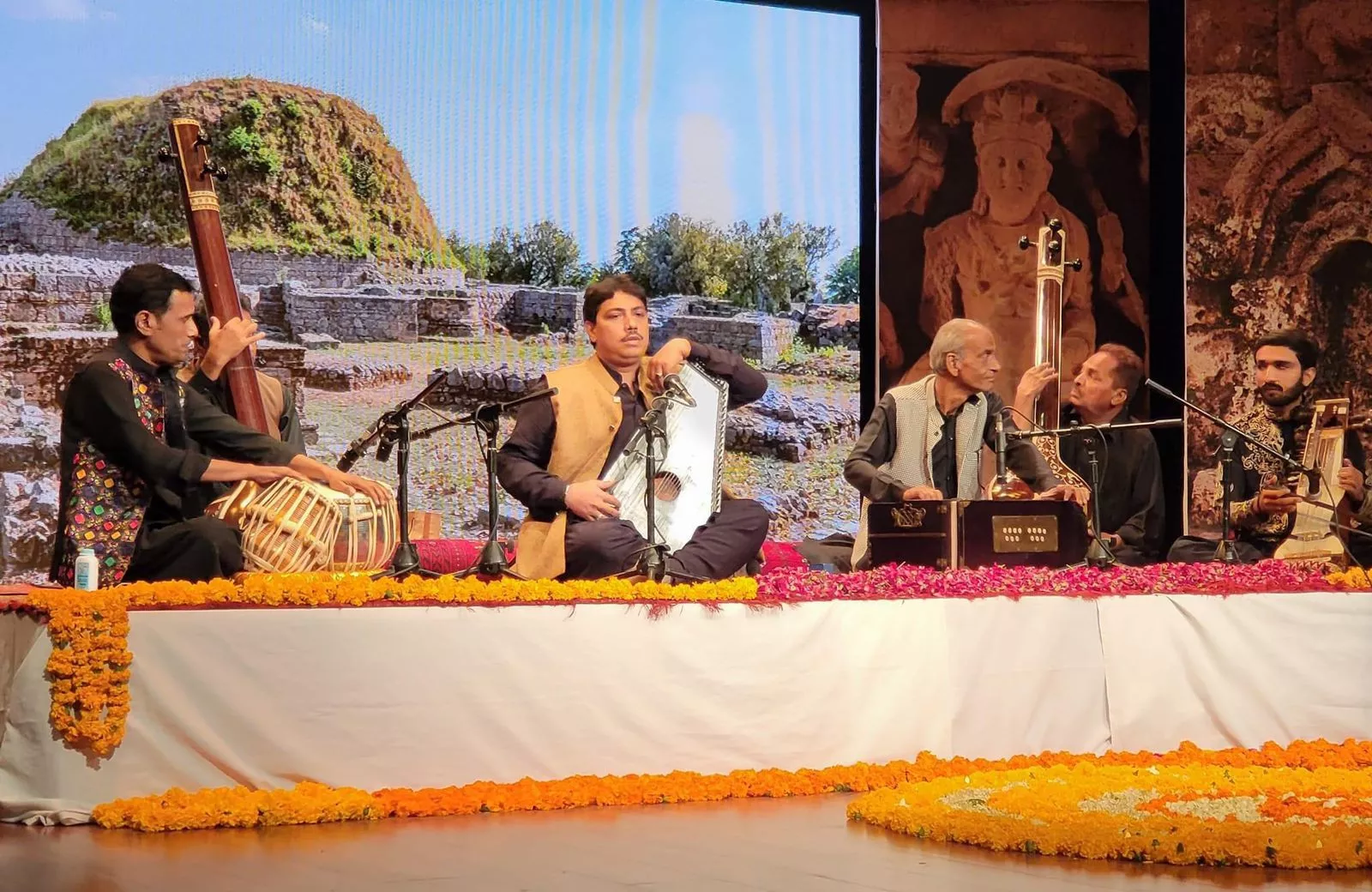The 13th Tehzeeb festival enthralls audience
The two-day showcase featured a wide range of folk and classical music performers
After two long years of releasing pre-recorded online gigs, last Saturday saw, the 13th Tehzeeb Festival resume live musical performances at the National Academy of Performing Arts (Napa). The event garnered a bevy of enthusiastic classical music fans who attended the occasion with high hopes and left in awe. From Izzat Fateh Ali Khan's mesmerising vocals to Vidya Shah's heart-felt Thumri, this year's Tehzeeb Festival brought together a plethora of classical and folk musicians under one roof.
The festival kicked off in the evening with the legendary Ustad Fateh Ali Khan's son Izzat Fateh Ali’s rendition of raag Chandar Kanra. Instantly, the young musician won the hearts of the audience as they applauded his excellent vocals. Although thirteen-year-old Izzat was the youngest performer in the whole festival, his spirit and talent were ambitious enough to the otherwise very puritanical and high standards set by Tehzeeb.
Joining the festival from Norway, Asad Qizilbash played the Sarod in a pre-recorded clip for the audience. Although miles apart, his music still made waves. Qizilbash is the only Sarod player in Pakistan since 1992, so even his digital presence stood as an ode to the traditional instrument, keeping its essence alive.
1667887873-1/WhatsApp-Image-2022-11-06-at-21-33-41-(1)1667887873-1.jpeg) Following Qizilbash, solo artists performed a Jugalbandi. Taking the spotlight, Gul Muhammad played the Sarangi, Zulqarnain Haider the flue and Yousuf Bashir was on the Tabla, together the three flattered the crowd with their euphonious melodies. Perhaps the best part of this performance was the beauty of harmony that was slowly built up by the musicians themselves. Unlike most music, the Jugalbandi displayed the raw and improvised side of classical music, a real-time display of how tunes come together to form a universe of their own.
Following Qizilbash, solo artists performed a Jugalbandi. Taking the spotlight, Gul Muhammad played the Sarangi, Zulqarnain Haider the flue and Yousuf Bashir was on the Tabla, together the three flattered the crowd with their euphonious melodies. Perhaps the best part of this performance was the beauty of harmony that was slowly built up by the musicians themselves. Unlike most music, the Jugalbandi displayed the raw and improvised side of classical music, a real-time display of how tunes come together to form a universe of their own.
Moving on, the festival featured Vidya Shah, a Carnatic musician residing in India. She recreated a beautiful Thumri and a ghazal in a pre-recorded clip to play her part in promoting Hindustani classical music in Pakistan. Kheyal singer, Imran Ilyas Khan also sang brilliantly to the tunes of their partners playing the Tabla and Harmonian.
Later, Imran Abbas Khan similarly sang a Kheyal solo, capturing the entire attention of the crowd. Afterwards, Ustad Ashraf Sharif Khan, Ustad Shahbaz Hussain, and Saphwat Simab took the stage with a Sitar, Tabla Solo, and Kheyal respectively. Each performer had a distinct skill that made them equally compelling to watch.
After four-long hours of excellent classical renditions, the night ended with the great Ustad Fateh Ali Khan singing a Kheyal and Tarana. Beginning the event with the Izzat as the future face of classical music and concluding it with Khan painted a reflective picture of the indigenous music industry in Pakistan.
Speaking to The Express Tribune, Sharif Awan, the founder of Tehzeeb Foundation shared his view on the two-day music performances and their importance for the masses. He said, "For the past two years, the world was standstill due to the aftermath of coronavirus. During this time, physical concerts were shut down worldwide, therefore when we announced our live performances, the audience was quite enthusiastic.”
Awan also shed light on the new faces seen this year and talked about how their foundation hunts for new talent. "Our talent hunts are a year's worth of effort, Zulqarnain Haider was also a new performer and quite undiscovered before this festival," Awan added.
"The main challenge for our festival is that people have different priorities. There is no budget set for cultural societies by the government. Therefore, many organisations are working for free to promote it out of their passion. Also, we don't take foreign funding and only rely on business resources."
Awan further described the plight of indie classical musicians. He expressed, "People don't want to pay for music; they will eat expensive food and play commercial music in their households at weddings, but won't pay to acknowledge another musician. Similar to how people don't like buying books and have little value for literature and fine arts. So, when we hold such festivals, our sole aim remains to just promote our culture, and carry it to future generations."
Before the festival kicked off, Napa CEO Junaid Zuberi was called to the podium to share his thoughts about the event. He said, "Classical music is our culture and identity, and Napa's purpose is to preserve the art, which is why Tehzeeb Foundation is tied to us, and we will continue to work with them in the future." He concluded
Tehzeeb Foundation was established in 2008 and held its first festival the following year. The primary function of the organisation is to promote Pakistan's "aesthetic culture." According to Awan, the nation is full of amazing dance, music, and art. Having such a strong culture is the parameter to describe a prosperous country. However, in Pakistan, the culture is present, but nobody is ready to take a stand and own it.
On Sunday, the festival continued to feature more artists from Indo-Pak music, such as Ritika Dhanja, Aizaz Sohail, Ustad Mumtaz Ali Sabzal, Pandit Nirmalya Dey, and Tehreema Mitha. The performances included dance recitals, single solos, and Balochi folk music.
Have something to add to the story? Share it in the comments below.


COMMENTS
Comments are moderated and generally will be posted if they are on-topic and not abusive.
For more information, please see our Comments FAQ